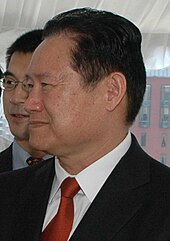Zhou Yongkang
Zhou Yongkang ( Chinese 周永康 , Pinyin Zhōu Yŏngkāng ; * December 1942 in Wuxi , Jiangsu Province ) was a top Chinese politician of the Communist Party of China (CCP) until 2013 . Since the end of the Cultural Revolution in 1976, he is the only former member of the Chinese Communist Party's Standing Committee to be expelled from the CCP and sentenced to life imprisonment by a people's court for corruption, abuse of power, and betrayal of secrets.
Political career
Ascent
Zhou joined the CCP in November 1964. From 1983 to 1985 he was the mayor of Panjin City . From 2003 to 2007 he was the successor to Jia Chunwang as Minister of Public Security in the People's Republic of China. He was a member of the State Council from 2003 to 2008 . From October 2007 to November 2012, he was a member of the Standing Committee of the CCP Political Bureau and secretary of the Central Committee's Political and Legal Commission. During his time as the head of security in China, he was considered the third most powerful man in China, and his ministry's budget exceeded that of the Ministry of Defense. He was responsible for the State Security Bureau, the courts, the police and paramilitary police forces.
descent
The CCP Central Disciplinary Commission , which led Xi Jinping's anti-corruption campaign , has been dealing with Zhou Yongkang since the summer of 2013 on suspicion of corruption. As of October 2013, he no longer appeared in public. Until then, the unwritten rule was that members of the Standing Committee would not be prosecuted for possible offenses after their resignation.
On December 1, 2013, the Communist Party Disciplinary Commission decided to open an official investigation into Zhou's conduct. This investigation report was presented to the CCP Central Committee on July 29, 2014, which decided to open an investigation into Zhou. On December 5, 2014, an arrest warrant was issued for Zhou and he was arrested. The Standing Committee had previously decided to revoke Zhou's party membership and refer the case to the relevant authorities. The official justification released by the Xinhua News Agency charged him with various offenses, including "serious violations of party discipline," which means corruption in the CCP's language. Zhou was also accused of betraying state and party secrets and multiple adultery with several women in connection with the corruption cases because he used his influence in exchange for sex. Money and material resources did not always flow directly to him, but also to family members and friends. He, his family and friends would have had great personal advantages; the state, on the other hand, suffered losses through its actions. Zhou, the most powerful Chinese politician since the trials of the Gang of Four, was arrested by the authorities. In March 2015, Zhou was also charged with "engaging in machinations related to the trafficking of organs from executed prisoners."
On June 11, 2015, Zhou was sentenced to life imprisonment, lost his life civil rights and confiscated his personal property. The trial took place in Tianjin on May 22nd, in camera , because it was also about betrayal. The court found Zhou guilty of taking bribes totaling approximately RMB 130 million . The money should not have flowed to him directly, but to his wife, who testified in the process as a witness. Zhou is said to have known about the money. Zhou himself reportedly accepted RMB 731,000 worth of money and valuables. He was also found guilty of divulging five highly confidential and one confidential government papers. Zhou accepted the sentence and announced that he would not appeal. Because he confessed and showed repentance, the court waived a possible death penalty for his offenses.
Web links
- Website Chinae vitae: Biography (English)
- Zhou Yongkang: 9 Things You Must Know, August 7, 2014 on YouTube
Individual evidence
- ↑ a b c d China expels Zhou Yongkang from Communist party in The Guardian , December 5, 2014, accessed December 6, 2014.
- ^ Former China security chief faces corruption probe - Reuters, August 30, 2013.
- ↑ Petra Kolonko: Investigations against party leaders: New corruption scandal shakes China. In: FAZ . January 29, 2014, accessed January 29, 2014 .
- ↑ a b c d Zhou Yongkang Arrested, Expelled from CPC on China Radio International December 6, 2014, accessed December 6, 2014.
- ↑ Petra Kolonko: China's probably biggest corruption scandal. faz.net, March 4, 2014, accessed March 4, 2014.
- ↑ China arrests ex-security chief ( memento from December 9, 2014 in the Internet Archive ) Tagesschau online, December 5, 2014, accessed on December 6, 2014.
- ↑ China arrests ex-security chief Zhou Yongkang. BBC News, December 5, 2014, accessed December 5, 2014 .
- ^ The big business with hearts and kidneys in FAZ of March 17, 2015, page 6.
- ↑ Zhou Yongkang Sentenced to Life in Prison, No Limits for Anti-corruption from: China Radio International, June 11, 2015, accessed June 12, 2015.
- ↑ Zhou Yongkang sentenced to life in prison on Xinhua News , June 11, 2015, accessed June 11, 2015.
- ↑ China's former security chief given life sentence for corruption in: TheGuardian.com June 11, 2015, accessed the same day.
- ↑ Petra Kolonko, The Fall of the Great Zhou . FAZ of June 12, 2015, p. 5.
| personal data | |
|---|---|
| SURNAME | Zhou Yongkang |
| ALTERNATIVE NAMES | 周永康 (Chinese) |
| BRIEF DESCRIPTION | Chinese politician and security minister of the PRC |
| DATE OF BIRTH | December 1942 |
| PLACE OF BIRTH | Wuxi , Jiangsu |
